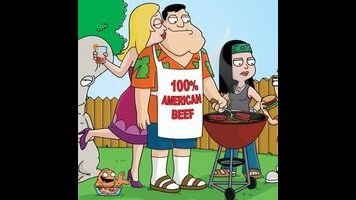American Dad: “Stanny Tendergrass”

It’s funny how timing can alter an episode of a show. American Dad’s varying production/airing times mean that many episodes were produced months or years before their airing, but that kind of thing can alter how those episodes are perceived. “Stanny Tendergrass” immediately announces its lack of timeliness, as an episode premised on the idea that Stan—and Steve—are able to take summer jobs, with Steve out of school and Stan on summer hours at the C.I.A. It then turns into a straightforward “slobs versus snobs” story.
Or at least, a “slobs versus snobs” story is what it would have been, six months ago, or nine months ago when, perhaps, it was supposed to have aired. Now? You can’t help but think that it got on the schedule in relation, somehow, to the Occupy movement’s PR success in making class warfare sexy. Which is not to say that this episode was revolutionary Marxist stuff, but rather that the implications of its airing now create a slightly different viewing experience than might have been intended.
What did air was another fine episode of American Dad, and another example of why this show is easy to underrate. If I were called upon to describe just why this was a good example of the show, just about all I could do was describe a few of the jokes. But I’m a critic! I’m supposed to have the words.
The thing that makes this episode effective, and maybe even a little bit smart, is that it engages with the idea that people present themselves according to the positions that they’re in. It’s social psychology, not personality—our contexts determine our behavior. Stan takes a position as a working man, and so, for the first two-thirds of the episode, he also adopts the morality of the working man, up to and including a visual analysis of the proper blue-collar handshake.
But once Stan sells out and joins the country club he’s had his eyes set on, he changes his tune. He becomes the asshole he’d spent the previous part of the episode hating. Indeed, because he changes so much, he frightens Steve, who’d previously filled that role. Steve eventually comes around, and then convinces Stan to come around by confronting him with Hulk Hogan, blue-collar American hero. So there’s a montage where Stan and Hulk beat up rich people, which meets expectations.
In the B-plot, Francine tries to think of a catchphrase. This is the kind of idea that should really work well, largely because, well, it’s Francine, searching for meaning. And while her failures while she’s being ignored are moderately amusing, the plot doesn’t go too far beyond that. A mild success causes her to go overboard, then it’s revealed that it wasn’t even her catchphrase at all. Part of me feels like this side plot was wasted, but then, perhaps the limitations of a plot built around catch phrases made that inevitable. Like most of the episode, it’s generally pleasant, with some sublime moments.
Stray observations:
- “Now you have a problem with soda and being rich?”
- “You were Alicia Witnner? But we went on seven dates!” “Nine. I roofied you twice.”
- “Yeah! I hate birds and am therefore glad that you kicked one! Here is money!”
- “I know you have a lot of questions so I’ll just answer ‘em. The dean closes down the campus pizza shop and the Ninja Turtles. Do. Not. Take. It. Well.”